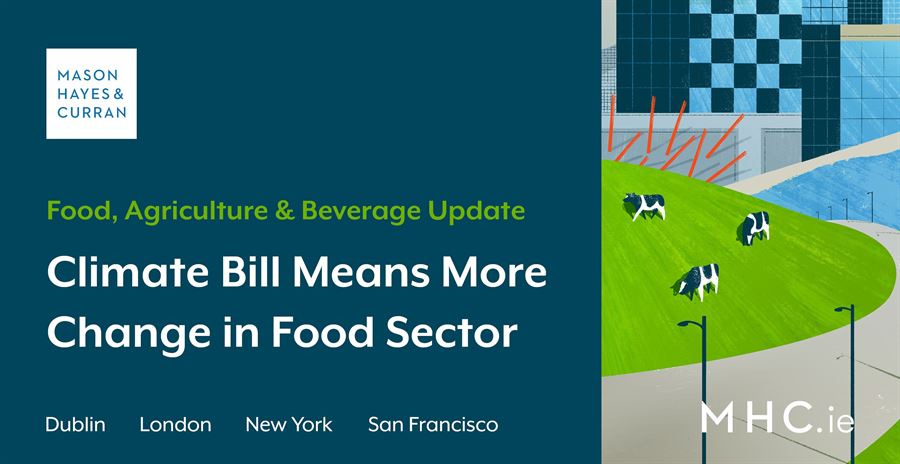
The Climate Action and Low Carbon Development (Amendment) Bill 2021 supports Ireland’s national climate objective of “net zero” emissions. It will establish a legal framework to facilitate a climate resilient, biodiverse and climate neutral economy by 2050. Much commentary has focused on the “special economic and social role of agriculture” in the revised section 4 introduced by the Bill. However, the food, fisheries and agricultural sectors should beware of the detail, as the Bill also provides that the national Climate Action Plan will be a mechanism to deliver Ireland’s national climate objective, with the Interim Plan for 2021 already indicating that further strategic changes are in store for these industries.
What will the Bill do?
The Bill will amend the Climate Action and Low Carbon Development Act 2015 (“Principal Act”) to specify the national climate objective of carbon neutrality, which is to be delivered by way of:
-
Carbon budgets
-
Sectoral emission ceilings
-
The national Climate Action Plan
-
A National Long-Term Climate Action Strategy, and
-
A National Adaptation Framework
All of these mechanisms must conform to Ireland’s obligations under EU and international law, including the Paris Agreement, and take up-to-date national greenhouse gas inventories and projections into account.
For carbon budgets, the Government will be required to adopt 5-year budgets on a rolling 15-year basis starting in 2021, with the first two to equate to a total emissions reduction of 51% up to 2030. All greenhouse gas emissions, including biogenic methane, should be included in the carbon budgets. The role of the Climate Change Advisory Council is being reinforced by the Bill, as it will be the body responsible for proposing a programme of three successive 5-year carbon budgets to the Minister for the Environment, Climate and Communications (“the Minister”).
The various emissions ceilings, i.e. maximum greenhouse gas emissions, for each relevant sector will be developed by the Minister and submitted to the Government for approval after each carbon budget takes effect.
National Long-Term Climate Action Strategy
A National Long-Term Climate Action Strategy is also to be prepared every 5 years and will outline the opportunities available to meet the national climate objective over a minimum 30-year period. In turn, local authorities will be requested within 18 months of the enactment of the Bill to prepare their own individual Climate Action Plans in line with the national Climate Action Plan and National Adaptation Framework, which should include both climate mitigation and adaptation measures.
However, it is the national Climate Action Plan mechanism introduced by section 6 of the Bill which has the potential to be the most dynamic aspect of the new Climate framework. Replacing the National Mitigation Plan process under the Principal Act, the national Climate Action Plan will set out detailed actions for each sector in the short to medium term, and will be updated on an annual basis. While Ireland’s first Climate Action Plan was issued in 2019, the mechanism was not previously incorporated into the legal framework of the Principal Act.
Actions for various sectors
The 2019 Climate Action Plan had set out 183 different actions across various sectors including agriculture, forestry and land use, waste and the circular economy, with timelines and responsibilities clearly mapped out. The recent Interim Climate Action Plan 2021, which will be used to drive climate action while the Climate Action Plan 2021 is being prepared for publication later this year, contains 250 actions. Those which apply to the food, fisheries and agricultural sectors include:
-
Action 140 on the publication of the 2030 agri-food strategy, covered in our update here
-
Action 146 on measures to improve nitrogen use efficiency
-
Action 147 on measures to promote improved efficiency of livestock
-
Action 150 on the review of authorisation of new animal feed additives which reduce the production of biogenic methane
-
Action 191 on developing online tools for resource use efficiency by seafood processors, and
-
Action 201 on developing a food waste prevention roadmap to halve food waste by 2030
These diverse and ambitious Actions show how instrumental the national Climate Action Plan will be in implementing Ireland’s climate goals, and how the annual update to the Plan will significantly impact the agri-food sector. Implementing the Actions will present major challenges for the sector, with concerns already expressed by producers that the new measures and regulation will add cost and affect incomes.
Conclusion
The national Climate Action Plan is being hailed as Ireland’s roadmap to becoming a carbon neutral economy by 2050. As the Bill will soon make it one of the main legal mechanisms for realising national climate goals, it is crucial that sectors like the food, agriculture and fishing industries are not only aware of the Plan’s targets, but also actively contribute to the climate conversation so that the needs of industry are considered, and any barriers to and costs of compliance with the Plan’s targets are minimized.
To that end, the Government is currently seeking views to be taken into account in the development of the 2021 Climate Action Plan. Submissions can be made via the Government’s consultation platform until 18 May 2021.
For more information on the scope and implementation of the Climate Action Amendment Bill's agenda and its potential impact on your business, contact a member of our Food, Agriculture & Beverage or Product & Consumer Law teams.
The content of this article is provided for information purposes only and does not constitute legal or other advice.




